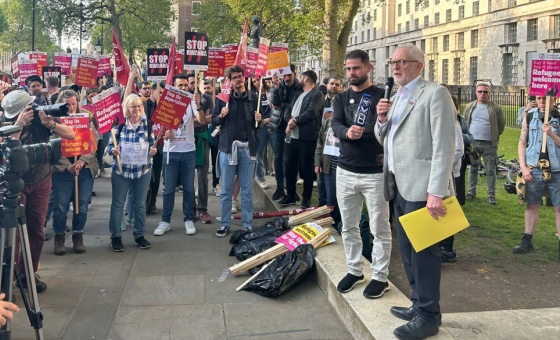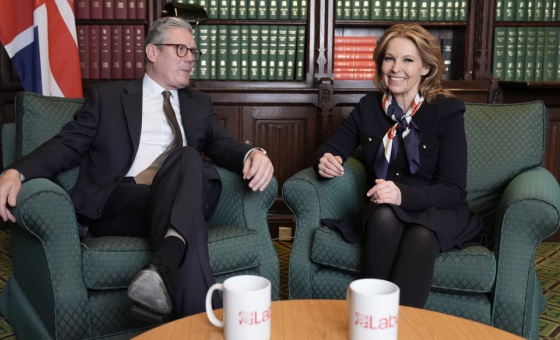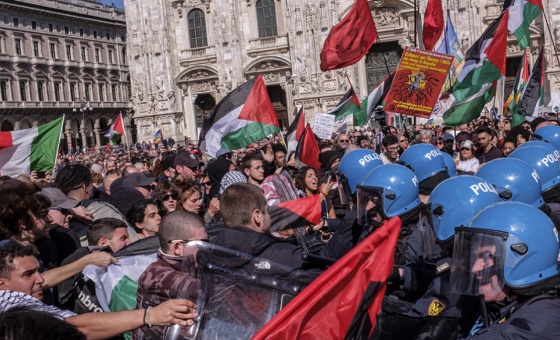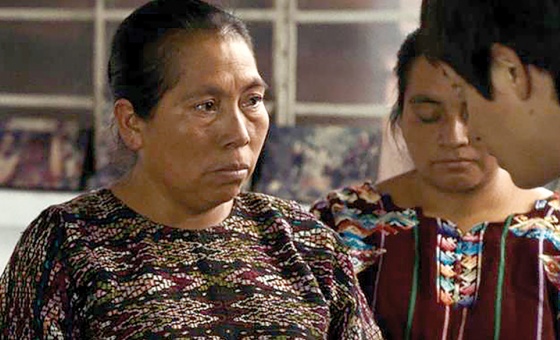This is the last article you can read this month
You can read more article this month
You can read more articles this month
Sorry your limit is up for this month
Reset on:
Please help support the Morning Star by subscribing here
DENIS HEALEY was a tough bruiser of a politician who fought against the left in the Labour Party but ended up a critic of Tony Blair.
He started his political life as a fervent communist and admirer of the Soviet Union.
Yet he spent 40 years combating the socialist left, directing his withering fire against supporters of Aneurin Bevan in the 1950s and Tony Benn in the ’70s and ’80s.
As chancellor of the exchequer he played a major role in Labour’s downfall at the 1979 election by imposing draconian spending cuts and wages curbs on the orders of the International Monetary Fund in exchange for a massive loan.
He was often rude, crude and brutish toward his opponents, but he also had a robust sense of humour and a lifelong love of art, music and poetry — he called this his “hinterland.”
Born in 1917, Denis Winston Healey spent most of his boyhood in Keighley, Yorkshire, where his father was principal of a technical college.
He won a scholarship to Bradford Grammar School and entered Balliol College Oxford in 1936.
He joined the Communist Party in 1937, inspired by the party’s anti-fascism and the republican struggle for democracy in the Spanish civil war.
Healey was a leading member of the party at Oxford and became treasurer of the October Club, which was the Communist section of the Oxford University Labour Club.
He was an ardent defender of the party line. One of his former college comrades recalled how Healey discovered him reading Trotsky’s book The History of the Russian Revolution.
Healey stormed into the room, roared that he must stop reading the book, and threatened to have him drummed out of the party for daring to look at a book by “that traitor Trotsky.”
During WWII, Healey served in the army in Italy, Sicily and north Africa, reaching the rank of major.
He played a leading role in the successful Anzio landings in 1944, where he was a military landing officer.
His former Communist comrades were surprised when he suddenly appeared at the Labour Party conference at the end of WWII in 1945.
In his army uniform, the 28-year-old Healey strode to the conference rostrum and hailed “the socialist revolution that has already begun in Europe.”
Declaring that “the upper classes in every country are selfish, depraved, dissolute and decadent,” he went on to defend European revolutionaries’ “drastic punishment” of opponents.
He unsuccessfully contested the seat of Pudsey in the 1945 election, but soon landed the full-time job of secretary of the Labour Party’s international department.
His lurch to the right was then rapid and profound. He admitted in his autobiography that his closest personal friends were US citizens in London, including several staff at the US embassy.
He married schoolteacher Edna Edmunds in 1945, a former Communist comrade of his at Oxford. She later wrote biographical works on Emma Darwin, Jenny Marx, Mary Livingstone and Victorian philanthropist Angela Burdett-Coutts.
She died in July 2010.
Healey entered the Commons in 1952 at a by-election in Leeds, and he remained an MP for 40 years.
He was defence secretary from 1964-70 and chancellor from 1974-79.
When he stood for the Labour leadership in 1976, he gathered just 38 votes. His cause was not helped when he unleashed a tirade against left MPs, accusing them of being “out of their tiny Chinese minds.”
He contested the leadership once again in 1980, losing to Michael Foot by 139 votes to 129 — in an election where only Labour MPs had a vote.
Healey became deputy leader, but Tony Benn challenged him for the post in 1981 under the new electoral college arrangements. Healey scraped in by a margin of less than 1 per cent.
He refused to join the right-wing breakaway Social Democratic Party formed by the “gang of four,” former ministers David Owen, Roy Jenkins, Shirley Williams and William Rodgers.
Healey clashed frequently with Tory prime minister Margaret Thatcher, accusing her of “adding the diplomacy of Alf Garnett to the economics of Arthur Daley.”
He described her as “La Pasionaria of middle-class privilege” and declared: “I often compare Margaret Thatcher with Florence Nightingale. She stalks through the wards of our hospitals as a lady with a lamp. Unfortunately, it’s a blowlamp.”
Healey became a minor TV personality, renowned for his bushy eyebrows. He appeared with Dame Edna Everage and in the Morecambe and Wise Show.
In 1992 he accepted a peerage, cheerfully describing the Lords as “the house of the living dead” while accepting all the privileges.
He spoke out against the Iraq war, demanding that Tony Blair should resign over false claims about weapons of mass destruction.
Blair he condemned as “a bullshitter” and US president Bush as “a lunatic.”
However he failed to apologise for his own destructive role in pushing the Labour Party sharply to the right, paving the way for New Labour and its disastrous policies.
In the recent Labour leadership election, Healey once again rejected left-wing policies and supported Yvette Cooper.
He nevertheless remained a proud member of the Labour Party right to the end of his long and eventful life.










